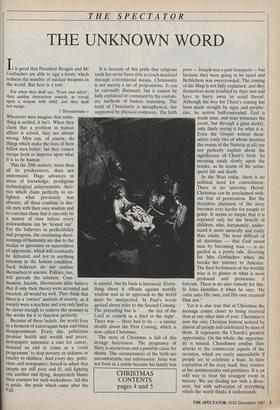THE SPECTATOR
THE UNKNOWN WORD
It is good that President Reagan and Mr Gorbachev are able to sign a treaty which reduces the number of nuclear weapons in the world. But here is a text:
For when they shall say, 'Peace and safety'; then sudden destruction cometh, as travail upon a woman with child, and they shall not escape.
I Thessalonians v Whenever men imagine that some- thing is settled, it isn't. When they claim that a problem in human affairs is solved, they are always wrong. Men can, of course, do things which make the lives of their fellow men better; but they cannot escape from or improve upon what it is to be human.
This the 20th century, more than all its predecessors, does not understand. Huge advances in areas of knowledge, prodigious technological achievements, theo- ries which claim perfectly to en- lighten what previously was obscure, all these combine to daz- zle men with their own wisdom and to convince them that it can only be a matter of time before every awkwardness can be 'ironed out'. For the believers in perfectibility and progress, the continuing short- comings of humanity are due to the malice or ignorance or superstition of opponents, which will eventually be defeated, and not to anything inherent in the human condition. Such believers do not confine themselves to science. Politics, too, will provide the solution. Com- munists, fascists, libertarians alike believe that if only their theory were accepted and enacted, all would be well. They think that there is a 'correct' analysis of society, as if society were a machine and you only had to be clever enough to remove the spanner in the works for it to function perfectly.
Because of these beliefs, the world lives in a ferment of extravagant hope and bitter disappointment. Every day, politicians promise health and wealth and peace; newspapers announce a cure for cancer, demand an end to crime or a 'crash programme' to stop poverty or sickness or cruelty to children. And every day, politi- cians and newspapers, forced to admit that people are still poor and ill, still fighting one another and dying, desperately blame their enemies for such wickedness. All this is pride, the pride which came after the Fall. It is because of this pride that religious truth has never been able to reach mankind through conventional means. Christianity is not merely a set of propositions. It can be rationally discussed, but it cannot be fully explained or contained by the custom- ary methods of human reasoning. The truth of Christianity is metaphysical, but supported by physical evidences. The faith is eternal, but its basis is historical. Every- thing about it offends against worldly wisdom and so its approach to the world must be unexpected. St Paul's words quoted above refer to the Second Coming. The preceding line is `. . . the day of the Lord so cometh as a thief in the night'. There was — there had to be — a similar stealth about the First Coming, which is now called Christmas.
The story of Christmas is full of this strange furtiveness. The pregnancy of Mary is mysterious and a possible cause for shame. The circumstances of the birth are uncomfortable and unforeseen: Jesus was not born in a stable because his family was In the West today, there is no political need for concealment. There is no latterday Herod. Christmas can be proclaimed with- out fear of persecution. But the deceptive plainness of the story becomes ever harder for people to grasp. It seems so simple that it is repeated only for the benefit of children, who, fortunately, under- stand it more naturally and easily than adults. The most difficult of all doctrines — that God saved man by becoming man — is re- garded as a pretty tale, diverting for Mrs Gorbachev when she breaks her journey to America. The final foolishness of the worldly wise is to glance at what is most profound and pronounce it babyish. There is no sure remedy for this: St John identifies it when he says, 'He came unto His own, and His own received Him not.'
Yet it is also true that at Christmas the message comes closer to being received than at any other time of year. Christmas is now the only Christian festival noticed by almost all people and celebrated by most of them. It represents the Church's greatest opportunity. On the whole, the opportun- ity is missed. Churchmen confine their attacks to the commercial aspects of the occasion, which are surely unavoidable if people are to celebrate a feast. In their exposition of the story itself, they connive at the sentimentality and prettiness. It is an odd way to treat the strangest event in history. We are dealing not with a diver- sion, but with subversion of everything which the world thinks it understands.










































































































 Previous page
Previous page